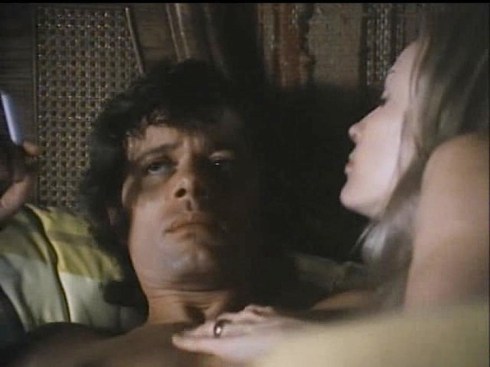
The Reincarnation of Peter Proud 1975
The Reincarnation of Peter Proud (1975): A Haunting Echo Across Lives
The Reincarnation of Peter Proud, directed by J. Lee Thompson (Tiger Bay 1959, The Guns of Navarone 1961, Cape Fear 1962, Eye of the Devil 1966, Conquest of 1972 and Battle for the Planet of the Apes 1973 ) and based on Max Ehrlich’s chilling novel, is a film that glides restlessly between psychological thriller and supernatural mystery. This intimate character drama stars Michael Sarrazin as the haunted title character. The film weaves the extraordinary into the fabric of the everyday, unraveling the threads of identity, the residual remnants and imprinted shadows, and the latent memories of past lives delivered by the mysterious hand of fate.
The story begins with Peter Proud, a professor in California, tormented by disturbing and increasingly vivid dreams and visions. These episodes are not merely nightmares; they play out as fragments of another life: a doomed man swimming at night, a strange lakeside house, a mysterious woman, and the specter of murder. Terrified and fascinated, Peter’s search for answers is clinical at first. He consults doctors and therapists, who offer only cold diagnoses and disbelief. But when clues in his dreams align with real locations and facts unearthed from old news reports, skepticism gives way to the uncanny.
Driven by the weight of these visions, Peter is compelled to travel from the safety of the West Coast to a small town in Massachusetts. There, the boundaries between past and present begin to shatter. He discovers that the settings and faces haunting his sleep belong to a very real and very tragic chapter in the town’s history. Before long, Peter meets Ann Curtis (Jennifer O’Neill), a young woman inextricably bound to these events, and her mother, Marcia Curtis, played by Margot Kidder, a woman who is drinking away her pain and whose presence radiates menace and heartbreaking loss.
With each revelation, Peter finds himself reliving the final days of another man, Jeff Curtis, whose violent death decades earlier remains unsolved. Peter’s relationship with Ann and Marcia is fraught with jealousy, betrayal, and hidden desire. The film’s tension builds not just from ghostly premonitions but from the growing sense that Peter’s fate is entwined inescapably with mysteries that refuse to die. His bond with Ann shifts from curiosity to affection, even as the possibility dawns that his life is headed toward the same violent, fated end as that which has consumed his dreams.
Sarrazin’s restrained performance centers the film, as Peter wrestles with terror and longing, and by O’Neill’s sensitive turn as the beautiful Ann, whose vulnerability and strength deepen the story’s emotional stakes. Margot Kidder’s portrayal of the tormented Marcia is an ominous center of gravity, blending maternal warmth with chilling volatility.
Composer Jerry Goldsmith crafts an atmospheric, elegiac score, his music rippling beneath the surface like memories that refuse to rest. With its haunting, dreamlike beauty, Goldsmith’s melancholy music translates Peter’s journey as a remarkably sympathetic one that conjures otherworldly textures. The score is filled with a string ensemble and flutes, emotionally steeped piano lines, orchestral writing, subtle electronic motifs, a descending ostinato of piccolos and synthesizers, and seamless transitions from ethereal to orchestral flourishes.
The whole experience infuses the film with an aching sense of fate and regret. The strings evoke longing and sorrow, and the sparse use of brass and gentle piano refrains helps paint a pervasive sense of loss and yearning. The score actually takes on the film’s voice, which speaks of the psychological and supernatural tones that sing beneath an extraordinarily compelling musical narrative that mirrors Peter’s haunted journey.
A trailer a day keeps the Boogeyman away! The Reincarnation of Peter Proud (1975)
Victor J. Kemper’s cinematography (his prolific and influential contributions includes: They Might Be Giants 1971, The Hospital 1971, The Candidate 1972, The Friends of Eddie Coyle 1973, Dog Day Afternoon 1975, Audrey Rose 1977, Coma 1978, The Eyes of Laura Mars 1978, Magic 1978, …And Justice for All 1979) accentuates the sense of déjà vu, blending New England’s muted beauty with the surreal menace of half-remembered lives. Water, stone, mist, and landscapes merge in hypnotic, sometimes nightmarish images.
While The Reincarnation of Peter Proud draws upon the era’s fascination with the occult, its heart lies in its meditations on the legacy of trauma, betrayal, longing, and the mysteries we inherit. There is horror here, but also mournful beauty and a sense that some wounds, emotional and metaphysical, transcend time. Its climax is both inevitable and wrenching: in returning to the scene of an old crime as a new man, Peter seeks to break the cycle of violence, but finds that the past’s grip may be stronger than any will to escape.
Thompson doesn’t rush the story; what makes it so haunting is the way it lingers, letting its story unfold with an eerie patience that deepens its hypnotic pull. Stylistically, it is one of the things that has always drawn me to The Reincarnation of Peter Proud. The dialogue is often plainspoken, letting the performances and the cinematic mood do the supernatural hard work. Even decades later, the film’s atmosphere manages to haunt the screen elegantly. It’s the perfect meditation on fate and identity where love, guilt, and the unknown merge, and every life that takes breath carries an echo from before. For me, The Reincarnation of Peter Proud 1975 endures as a minor-key classic of ‘70s cinema: rich in unease, dreamy in its logic, and finally devastating in its sense that the past is never truly gone, merely waiting beneath the surface of the water and our dreams, ready to reclaim those who cannot forget.








